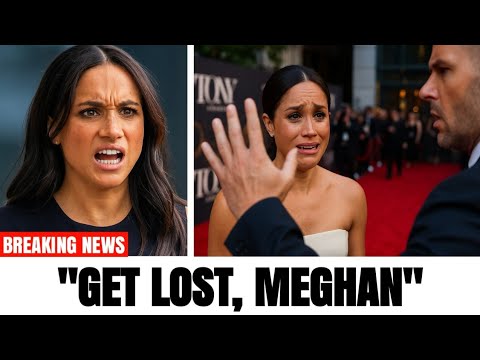Red Carpet DISASTER Meghan Markle Told to “GET LOST” at Tony Awards

Tears of desperation. Meghan Markle begs Netflix to keep her after a shocking career meltdown. Did her latest show really flop that hard? In a dramatic turn of events, Meghan Markle’s highly anticipated Netflix series with Love Meghan has become an absolute disaster.
The ratings are so bad that Netflix has placed her on a blacklist, and sources close to the Duchess reveal she’s in tears, pleading for another chance. What went wrong? Was the world simply not ready for Meghan’s reality show? Or is there more beneath the surface? Today, we dive deep into why Netflix’s biggest gamble with Meghan is turning into a PR nightmare and what’s at stake for her career.
Before we continue, please hit the like button, subscribe to the channel, and turn on the notification bell for updates.
The morning air in Los Angeles was unusually still as photographers gathered outside the polished glass exterior of Netflix’s California headquarters. Tension hung like mist in the atmosphere, and all eyes were fixed on one door. Within moments, it creaked open, revealing the instantly recognizable figure of Meghan Markle.
Dressed in an elegant but noticeably understated outfit, her eyes concealed behind dark sunglasses, she moved briskly past the cameras. But it wasn’t her clothes that told the story. It was the trembling in her hands, the quiver in her lower lip, the way her security detail hovered more protectively than usual. That was no ordinary business meeting—this was a reckoning.
Just days before, Meghan had been touting the premiere of her long-anticipated Netflix project, a personal docuseries titled With Love, Meghan. Built as a vulnerable, heartfelt exploration of womanhood, fame, and healing, the show had been pitched as Meghan’s definitive post-royal narrative. It was supposed to reset her public image. It was supposed to silence critics. It was supposed to be a hit.
Instead, it was a disaster. From the moment the show aired, trouble began to brew. Reviews weren’t just bad—they were brutal: limp, lacking purpose, overproduced naval gazing. Streaming analytics from Netflix showed shockingly low retention; the average viewer didn’t even finish episode one. Word spread fast. Social media roasted it mercilessly. And inside Netflix, the temperature dropped as executives began to reconsider the partnership they once celebrated.
The timing couldn’t have been worse for Meghan. This was more than just a television flop—it was an unraveling. The Duchess of Sussex had staked her credibility, her vision, and her future on this series. Sources close to the project confirmed that Meghan had personally overseen major elements of the show’s direction, its tone, its messaging, and its imagery. She wanted it to reflect her truth.
What she didn’t expect was that the audience would respond with deafening disinterest. And then came the consequences. In a leaked audio clip reportedly taken from a conference call, one Netflix executive was overheard saying, “We gave her the platform. We gave her control. We gave her trust. She gave us a flop.” Though officially unconfirmed, this statement sent shock waves through the entertainment world.
If true, it marked a dramatic shift in how the industry viewed Meghan Markle—not as a victim of a royal system or a voice of modern feminism, but as a liability. The fallout has been swift and unforgiving. According to insiders, Netflix immediately suspended upcoming funding tied to future Meghan-related projects under the Archwell banner. Internal communications instructed teams to pause all forward development until further notice.
Publicly, Netflix remained silent, but privately, it was clear Meghan had been quietly blacklisted. The image of a sobbing Meghan Markle leaving the Netflix building wasn’t just a paparazzi moment; it was a snapshot of the collapse of a personal empire meticulously crafted in the years since she and Prince Harry stepped back from royal duties.
For many, it was unthinkable. Just three years ago, Meghan’s voice carried across continents. She and Harry had secured multi-million dollar deals with Spotify, Netflix, and Penguin Random House. Their Oprah interview had shifted global opinion. They were hailed as disruptors. But in Hollywood, loyalty is as fickle as ratings.
What changed? That question forms the backbone of the story. Because to understand the events of that day outside Netflix HQ, one must rewind through a carefully laid series of ambitions, assumptions, and ultimately, miscalculations.
Meghan Markle believed the world was ready to hear her truth. What she didn’t anticipate was that the world might have already moved on. The stakes were enormous—not just for Meghan’s media career, but for her identity. This show wasn’t just content; it was a personal plea, a spiritual extension of herself built around themes of emotional resilience, wellness, femininity, and storytelling with love.
Meghan was meant to blend elegance with authenticity. But even before its release, some industry insiders were skeptical. One senior producer speaking anonymously said, “The problem wasn’t the production quality.”




